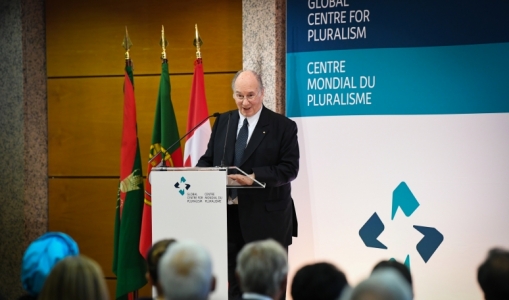Speech by His Highness The Aga Khan at the 7th Annual Pluralism Lecture 2019-06-11
Bismillah-ir-Rahman-ir-Rahim
Ms. Mohammed,
Your Excellency, the President of the Assembly,
Excellencies,
Ladies and Gentlemen,
It is my great pleasure to welcome you, on behalf of the Board of the Global Centre for Pluralism, to the 2019 Pluralism Lecture here at the Ismaili Centre in Lisbon.
I am delighted that this seventh annual Lecture is being delivered in Portugal. And I say that not only because this beautiful country is steeped in global history and culture, and usually drenched in sunshine. For those of us who believe in the bridge-building work of pluralism, Portugal has much to teach, even as it confronts its own challenges.
This country is blessed with a long history of productive co-existence among Christians, Jews, and Muslims. The History of Al-Andalus was written here, on the Iberian Peninsula, between the 8th and 16th centuries. This blending of cultures, religions and languages brought innovations in architecture, agriculture, medicine and even cuisine that are woven now into the very fabric of modern Portugal.
In July last year, the Global Peace Index ranked Portugal amongst the five most peaceful nations in the world. And for good reason. At a time of rising intolerance, this country has established some of the most welcoming policies for migrants in Europe. As populations in many Western countries are aging, and even dwindling, Portugal is among the few that recognise that newcomers are essential to secure the country’s future.
This welcoming attitude is one of the most strongly associated with pluralism, which is the core mission of the Global Centre for Pluralism. As a beacon of research, education and dialogue, the Centre is drawing lessons from the political, social and cultural dynamics in diverse and divided societies around the world. I encourage all of you to explore what the Centre has to offer. By learning from others’ successes, we may help our own societies to “inoculate” themselves against the temptation to set various people against one another – including the temptation to exclude marginalised populations.
Tonight’s speaker, UN Deputy Secretary-General Amina Mohammed, has had an extraordinary life journey, and we are all privileged to be able to benefit from her insights. Thank you.
Ms. Mohammed’s active involvement with global development, and her passionate commitment to girls’ education – both go back almost twenty years, when she coordinated the Task Force on Gender and Education for the United Nations Millennium Project. In 2005, as Senior Special Assistant to the President of Nigeria on the Millennium Development Goals, she was charged with steering Nigeria’s debt relief funds toward achieving those Goals. The MDGs, in shorthand, refer to the eight Goals that gave the world a blueprint for tackling its greatest social and economic challenges from 2000 to 2015.
Ms. Mohammed at first described herself as something of a sceptic about that project – how could one possibly reduce the world’s challenges to eight goals? – she asked. Nonetheless, she embraced the cause. With dogged persistence, she helped to ensure that some one billion dollars a year went where it was needed and intended − to reducing maternal mortality, giving communities safe water access, and providing good schools and teachers for Nigerian students.
In 2012, Amina Mohammed took on another global role as Special Adviser to UN Secretary-General Ban Ki-moon on the next stage of the United Nations Development Planning – the 2030 Agenda for Sustainable Development. Her new challenge was to work with, a small number, 193 nations to replace the MDGs with a new overarching framework for global development up to 2030.
In characterising this new framework era, Ms. Mohammed has said and I quote: “Development is no longer an issue of the Global South. It is an issue of the Global North, South, East and West.” Indeed, all member nations of the United Nations − including Canada, Portugal and Nigeria − and 190 other countries, have accepted the Goals as their own national objectives. Agenda 2030 calls for action by all countries for all people.
Ms. Mohammed then stepped from the conceptual stage at the United Nations back into the implementation area at home. As Federal Minister of Environment, she steered Nigeria’s action on climate change and resource conservation for sustainable development.
Ms. Mohammed is an outspoken advocate for global action on climate change, for children’s education, and for the protection of human rights. Above all, she has described gender equality − Sustainable Development Goal number 5 − as the quote “docking station” for all the other Goals, an essential conduit for their achievement.
She has served as Director, Governor or Advisor on numerous Boards, including the Global Partnership for Sustainable Development Data, Canada’s International Development Research Centre, and the Global Development Program of the Bill & Melinda Gates Foundation. And she has received too many honours and awards for me to name, for I fear I will leave no time for her lecture.
Ladies and Gentlemen, it is my very great privilege to welcome our annual Pluralism Lecturer for 2019, Ms. Amina Mohammed.
Thank you.
- 4624 reads

